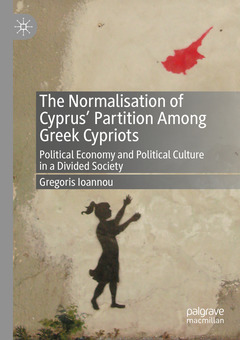Description
The Normalisation of Cyprus' Partition Among Greek Cypriots, 1st ed. 2020
Political Economy and Political Culture in a Divided Society
Author: Ioannou Gregoris
Language: English
Subjects for The Normalisation of Cyprus' Partition Among Greek Cypriots:
Approximative price 52.74 €
In Print (Delivery period: 15 days).
Add to cartPublication date: 09-2021
220 p. · 14.8x21 cm · Paperback
Approximative price 105.49 €
In Print (Delivery period: 15 days).
Add to cartPublication date: 09-2020
220 p. · 14.8x21 cm · Hardback
Description
/li>Contents
/li>Biography
/li>Comment
/li>
This book explores the basic dynamics that shaped the Cyprus problem, with a focus on recent decades. The author deals with the periods, nodal points and fields that produced the conditions for the normalisation of partition and also presents the Cyprus problem as viewed from the outside. The chapters approach Cyprus? division in light of power relations in society, the interaction between the political elite and society, and discuss the political and ideological dynamics as manifested in the public sphere. While analysing primarily the Greek Cypriot community, the book also refers to parallel developments in the Turkish Cypriot and international communities, arguing that the normalisation of Cyprus? partition is rooted in the political economy and political culture of Greek Cypriots. At the same time, from the perspective of the peace and reunification movement, this is an inherently contradictory and potentially unstable process that can be overturned.
?? remarkably thorough study focusing on nationalist narratives, political and media discourses and socio-economic structures in Cyprus and their impact on the formation and transformation of political identities since the 1950s. Unlike many other books on the issue, Ioannou analyses social and political developments in both the Greek-Cypriot and the Turkish-Cypriot communities. This approach sheds light on the internal reasons of the perpetuation of the island?s division, which the geopolitical and international relations approaches alone miss to grasp. Combining the analytical skills of a political scientist and his personal experience as an engaged citizen in favour of unification, Ioannou offers significant insight on a complex and traumatic conflict that remains one of Europe?s black spots.?
?Athena Skoulariki, Assistant Professor in Sociology of Communication, Discourse Analysis and Social Representations, University of Crete, Greece
?The basic argument of the book is that the consolidation of partition was neither automatic nor happened behind the backs of Greek Cypriots. The very interesting and demythologising work of Gregoris Ioannou brings to light a hidden, but common secret of the Greek Cypriots.?
?Alexis Heraklides, Emeritus Professor of International Relations, Panteion University, Greece
?Ioannou projects a multi-focal spotlight on the Cyprus problem, so as, at least for the careful reader, this becomes not only an interesting topic in itself, but, also a cognitive springboard from which to understand broader pathogenies of our common social and political life.?
?Seraphim Seferiades, Associate Professor in Political Science, Panteion University, Greece
Gregoris Ioannou is a research fellow at the University of Glasgow, UK. He previously taught at the University of Cyprus and Frederick University. His research focuses on class conflicts and social movements, contentious politics and the South European crisis, and his work has been published widely, including articles in journals such as Mobilization: An International Quarterly, Capital and Class, and Mediterranean Politics.
Offers a historicized argument about the process of subjectivity through which the partition has become normalized in the Greek Cypriot community
Approaches the partition of Cyprus from within the discipline of political sociology as opposed to anthropology, international relations, political science
Sheds light on the internal dynamics of the on-going division of Cyprus impacting on the EU relations with Turkey and the Greek-Turkish relations




